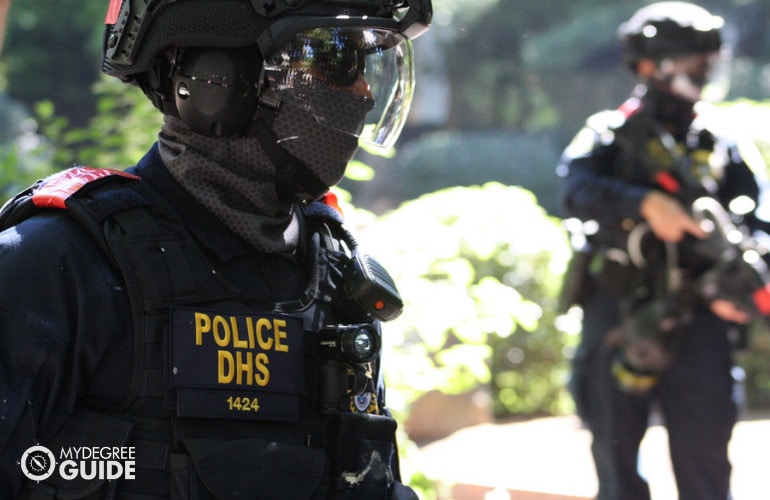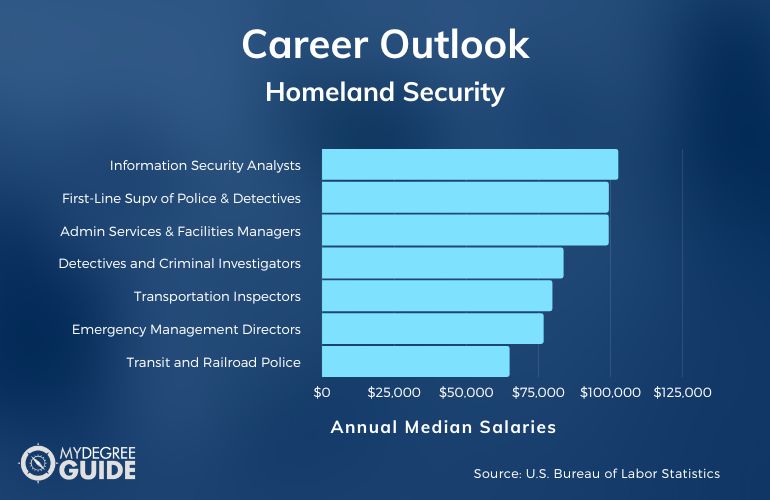Online masters in homeland security programs help equip students with knowledge and skills for more senior roles related to border security, emergency management, cybersecurity, antiterrorism, and civil defense planning.

Advanced training in homeland security can open doors to opportunities in a range of areas, from large federal agencies to private sectors such as consulting firms and global corporations.
Editorial Listing ShortCode:
In such a dynamic field, getting a master’s degree could be a strategic way to boost your expertise and qualifications.
Universities Offering Master’s in Homeland Security Online Degree Programs
Methodology: The following school list is in alphabetical order. To be included, a college or university must be regionally accredited and offer degree programs online or in a hybrid format.
American Public University
American Public University offers an online Master of Arts in Homeland Security program. Courses start monthly and are 8 or 16 weeks long.
This online master’s degree program requires the completion of 36 credits, and up to 15 qualifying credits can be transferred in. Topics covered include homeland defense, intelligence methods, terrorism, emergency management, public health, and information security.
APUS is accredited by the Higher Learning Commission.
George Washington University
George Washington University offers a Master of Professional Studies in Homeland Security. There are both online degree and in-person programs available. Both programs require the completion of 36 credits and can potentially be finished in just 16 months. They cover topics such as counterterrorism, intelligence analysis, emerging security threats, and relevant legislation.
George Washington University is accredited by the Middle States Commission on Higher Education.
Mississippi College
Mississippi College offers an online, Christian program for a Master’s in Homeland Security. Coursework includes Legal Aspects of Homeland Security, Grant Writing for Homeland Security, Cyber Terrorism, and more. This is a Christian program aimed to help working adults earn their degrees while balancing their multiple responsibilities.
Mississippi College is accredited by the Southern Association of Colleges and Schools Commission on Colleges.
Northeastern University
Northeastern University offers a Master’s in Homeland Security that can potentially be earned in just 12 to 18 months. Classes are available in online and hybrid formats and can be attended either part-time or full-time. Concentrations are available in Emergency Management, Organization and Infrastructure Continuity, Geospatial Services, and Port Security.
Northeastern University is accredited by the New England Commission of Higher Education.
Pennsylvania State University
Pennsylvania State University offers an online degree program for a Master of Professional Studies in Homeland Security. It requires the completion of 33 credits to graduate.
Available concentrations include Counterterrorism, Agricultural Biosecurity and Food Defense, Intelligence and Geospatial Analysis, and Information Security and Forensics. Other options are Public Health Preparedness and Cyber Threat Analysis and Prevention.
The Pennsylvania State University is accredited by the Middle States Commission on Higher Education.
Purdue University
Purdue University offers an online degree program for a Master’s in Homeland Security and Emergency Management. The program requires the completion of 55 credits, and each course is 12 weeks long. Multiple start dates are available each year. Coursework covers topics such as economics and resource availability, regulation and law, politics of security, dynamics of emergency management, and security and policy making.
Purdue University is accredited by The Higher Learning Commission of the North Central Association of Colleges and Schools.
Sam Houston State University
Sam Houston State University offers a Master of Science in Homeland Security Studies program that can be taken either on campus or online. It requires the completion of 36 credit hours and offers fall and spring enrollment. Applications are considered on a rolling basis. The program is designed to help students develop factual knowledge and strategic thinking skills.
Sam Houston State University is accredited by the Southern Association of Colleges and Schools Commission on Colleges.
Towson University
Towson University offers an M.S. in Integrated Homeland Security Management with specializations in Health Preparedness, Information Assurance, and Security Police. To graduate, students much complete a capstone research project. This is a flexible online program geared toward working professionals. Courses include online classroom discussions and the same quality of instruction as those on campus.
Towson University is accredited by the Middle States Commission on Higher Education.
Tulane University
Tulane University offers a Master of Professional Studies in Homeland Security Studies that can be earned either on campus, online, or through a combination of online and on-campus classes. Two optional concentrations are available: Cybersecurity and Intelligence. Core courses include Health and Medical Issues in Emergency Management, Intelligence Analysis and Critical Thinking, and Domestic and International Terrorism.
Tulane University is accredited by the Southern Association of Colleges and Schools Commission on Colleges.
University of Maryland Global Campus
The University of Maryland Global Campus offers an online program for a Master’s in Homeland Security Management. Select courses are available in a hybrid format. The program requires the completion of 36 credits, and up to 6 qualifying credits can be transferred in. Courses include Financial Decision Making for Managers, Biosecurity and Bioterrorism, and Information Technology in Emergency Management.
The University of Maryland Global Campus is accredited by the Middle States Commission on Higher Education.
Online Masters in Homeland Security Programs

For many people, the Department of Homeland Security is associated with the fight against terrorism and the prevention of both domestic and international threats. In addition, though, this agency also deals with vast emergency preparedness, civil defense, immigration policing, protecting critical infrastructure, and border protection operations and responsibilities.
These professionals can work in operational, administrative, managerial, and leadership roles related to a number of local and national security priorities and leadership challenges:
- Antiterrorism
- Cybersecurity
- Emergency management
- Law enforcement related to customs, borders, and immigration
- National defense logistics
- Public administration and public policy analysis
Professionals interested in this kind of degree might also consider a masters in national security or want to explore counter terrorism masters degree options.
Common Masters Degree in Homeland Security Specializations

Homeland security and multi-national corporate security efforts involve many kinds of operational expertise, policy understanding, and administrative experience.
As a result, there is often a range of academic concentrations to choose from when earning a masters in homeland security.
- Natural Disaster Planning and Emergency Response Management. With this specialization, you can study advanced methods in disaster management. You can learn how to assess, prepare for, and respond to large-scale natural disasters.
- Information Security. Information security analysts learn advanced computer and software skills designed to help them monitor computer networks and data systems as well as prevent and combat cyberattacks.
- Health and Medical Crisis Prevention and Response. This specialization combines training in large-scale emergency response with knowledge related to biological science, epidemiology, and medicine. Professionals in this sector help prevent and respond to health-related disasters or threats.
- Policy and Administration. Senior management roles in this field require advanced administrative skills for workforce development, budget planning, leadership skills, and logistical oversight. They often have to navigate settings that have complex organizational, political, legal, and policy dynamics.
- Immigration Law and Border Protection. With this specialization, you can learn about strategies and paradigms related to monitoring and protecting land, sea, and air transit routes, facilities, and ports of entry. You can explore advanced topics related to immigration policy, airport security, customs enforcement, and risk mitigation and assessment principles and methods.
Available concentrations can vary by school and program for online students, but this list can give you a glimpse of the various specializations online master’s programs in this field may offer.
Homeland Security Careers & Salaries

Careers related to homeland and private-sector security offer a variety of opportunities for professionals with a homeland security master’s degree. According to the Bureau of Labor Statistics, many of the careers found in this sector require specialized training and offer above average salaries.
| Careers | Annual Median Salaries |
| Information Security Analysts | $102,600 |
| First-Line Supervisors of Police and Detectives | $99,330 |
| Administrative Services and Facilities Managers |
$99,290 |
| Detectives and Criminal Investigators | $83,640 |
| Transportation Inspectors | $79,770 |
| Emergency Management Directors | $76,730 |
| Transit and Railroad Police | $64,930 |
| Police and Sheriff’s Patrol Officers | $64,610 |
| First-Line Supervisors of Security Workers | $50,240 |
| Transportation Security Screeners | $45,470 |
Large-scale emergency response, policing, antiterrorism, the prevention of both domestic and international threats security, and law enforcement efforts integrate the work of professionals across diverse career roles. This field includes senior management and administration roles, budget and operations analysis positions, and emergency management director roles.
Homeland security positions can also relate to information security, public policy analysis, and a range of policing and law enforcement operations and networks.
MS in Homeland Security Curriculum & Courses

A masters degree program can provide intensive and immersive learning experiences, helping professionals pivot to new careers or advance in their current careers. Here are examples of core courses you may come across in a masters program in this field:
- Public Administration in Security Agencies: This course is an overview of management methods used by top executives in government security agencies. It can cover skills related to finance and budgeting, public policy administration, workforce development, and program evaluation.
- Public Policy Research: This course covers resources and methods you can use to stay up to date on public policy and related administrative laws and regulations.
- Counter-Terrorism Defense and Risk Analysis: You’ll learn about strategic defense planning and risk forecasting. You’ll also study critical topics related to technology, surveillance, security, critical infrastructure protection, and civil liberties in the context of efforts to combat terrorism in the US.
- Land Border Security: You’ll learn about command structures, technologies, and defensive strategies and operational logistics related to maintaining effective border security.
- Maritime Transportation Security: This course introduces you to the complex array of maritime routes and ports related to the homeland security field, supply chains, transportation, and tourism. You’ll examine methods for planning and deploying defensive technologies and resources.
- Fundamentals of Emergency Management: You’ll learn about fundamental concepts and tactics related to the disaster cycle, encompassing prevention and mitigation, preparedness, response, and recovery.
- Crisis and Emergency Communications: This course explores the dynamics of managing communications operations, policies, and protocols in the context of large-scale public disaster and emergency response efforts.
- Policing and Investigative Methods: You’ll learn about objective policing and investigative methods used in law enforcement today, and you’ll review social research related to policing policies.
- Medical and Health Emergency Services: You’ll explore topics related to diverse medical and biohazard risks in the context of emergency planning and response frameworks.
- Risk Management: You’ll learn advanced methods in risk assessment and planning within a complex framework of relevant public policies, laws, directives, and incident management protocols.
Course outlines for an online master’s in homeland security will vary by school, but this course list can give you some insights into the range of topics you could learn about.
How to Choose an Online Homeland Security Master’s Degree Program

It’s beneficial for prospective students to consider the following program features when looking for the homeland security masters programs that best match your learning preferences and career advancement objectives:
- Curriculum design. Course offerings and specialized career pathways vary from school to school. You can look for programs with course designs that satisfy your learning needs and offer an academic specialization that fits your career goals.
- Tuition costs. Tuition costs can vary significantly from school to school, and some state colleges and universities may also offer residency-based tuition discounts.
- Online vs. hybrid learning. While some online master’s programs can be completed without any in-person learning requirements, hybrid programs have optional or required in-person learning formats in addition to online classes.
- Capstone requirements. It’s not uncommon for a masters program to require a masters thesis, but some programs offer capstone projects instead. Some programs may have supervised learning experiences too, such as a field study or internship requirement.
As you compare prospective programs, you’ll discover how offerings and requirements—including admissions requirements—can differ. It’s helpful to think about which considerations are most important for your own goals, leadership skills development, and preferences.
MA in Homeland Security Program Admissions Requirements

Many homeland security master’s degree programs require the following admissions requirements:
- GRE or GMAT scores (only some schools require them)
- Bachelor’s degree
- Letters of recommendation
- Official transcripts
- Relevant professional experience
- Statement of purpose
Admissions requirements vary by school and program, so it can be helpful to compare the requirements for prospective schools and check with their admissions offices if you have questions.
Master’s Degree in Homeland Security Accreditation

Looking for schools that have earned regional accreditation is a way to ensure that your courses and degree are recognized by other schools and prospective employers.
Attending a regionally accredited college for both your undergraduate degree and master’s program can also help you feel confident that you’re getting a rigorous curriculum, well-qualified faculty, and up-to-par academic resources and support. Accreditation can also be a precondition for some forms of financial aid and professional licensure or certification.
The Council for Higher Education Accreditation (CHEA) offers more information about accreditation and a database of accredited schools.
Homeland Security Certifications and Licensures

Professional certifications and licenses typically require academic qualifications and other requirements, such as specified work experience or passing a qualifying examination. Here are some examples of certifications related to this profession:
- Certified Emergency Manager: This kind of certification may be required or helpful for roles in organizations that involve emergency and disaster planning and response efforts.
- Homeland Protection Professional Certification: This certification is designed for public safety professionals and experts.
- Homeland Protection Associate Certification: This certification is offered at various levels, and qualifying for each level requires specified training, skills, and knowledge along with a qualification exam.
Professional certifications could help you demonstrate your specialized expertise and skill sets to prospective employers.
Financial Aid and Scholarships

Many professionals seek financial aid in order to help cover upfront costs associated with getting a masters degree and achieving their career advancement goals.
Common forms of aid include federal and state grants, scholarships, employer-based tuition assistance, and student loans. Terms and conditions of financial aid options and packages can vary, so it’s beneficial to review all offers carefully before proceeding.
To see if you’re eligible for different forms of need-based federal financial aid, you can fill out and submit the Free Application for Federal Student Aid (FAFSA).
Homeland Security Professional Organizations

In addition to getting a homeland security master’s degree, you may want to further boost your professional profile and prospects by joining relevant professional organizations.
- ASIS International (ASIS)
- International Association of Emergency Managers (IAEM)
- International Association of Law Enforcement Intelligence Analysts (IALEIA)
Being a member in a professional organization can help you follow news about trends in your field, learn about professional development opportunities, and network with others in your field.
What Does Homeland Security Do?

The US Department of Homeland Security (DHS) is part of a larger network of government agencies. Homeland security professionals can be responsible for intelligence gathering, large-scale emergency preparedness, national defense, anti-terrorism efforts, and related risk assessment and management work.
The DHS also plays a key role monitoring US borders and helping enforce customs and immigration laws. While many homeland security professionals work for the DHS, others may work for security firms, global corporations, or related government agencies, including in leadership positions.
What Can You Do with a Masters in Homeland Security?
The Department of Homeland Security works on many security fronts and involves various areas of emergency planning, investigative work, and national defense issues. Likewise, professionals pursuing a masters in homeland security can consider various branches of academic and professional specialization and training.
Most professionals in this field work for the government, but others are employed by firms in private sectors. Careers in this field include information security analyst, police investigator, administrative services and facilities manager, operations research analyst, and emergency management director.
While some careers in this field are projected for average job growth, others are expected to grow much more rapidly. For instance, the Bureau of Labor Statistics projects 33% job growth for information security analysts and 25% job growth for operations research analysts.
How Long Does It Take to Get a Homeland Security Masters Degree Online?
An online master’s in homeland security from an accredited college generally takes prospective students about 2 years or more to complete, while an online PhD in Homeland Security may take additional 3 to 5 years.
That said, some programs with less credit hour requirements and no thesis component may make it possible to finish in less time. For instance, a 36 credit hour program with no thesis requirement may be finished in 1 year with full-time, year-round enrollment, including summer. If you opt to study part-time, you’ll typically need more time to finish your online master’s degree.
Do You Need a Masters Degree for Homeland Security?

While there are a number of positions in the homeland security field that only require a bachelors degree, senior or management roles generally require advanced training.
In a masters program, you can learn about advanced management methods and acquire a deeper understanding of how to approach prominent leadership and policy challenges. Getting a graduate degree can typically help you qualify for more jobs and boost your confidence in the national security and emergency response sectors.
Is a Masters in Homeland Security Worth It?

Yes, a masters in homeland security is worth it for many students. When it comes to the safety of society, it’s critical to have passionate leaders with outstanding training and preparation.
This is a field with a wide variety of specialization areas, including antiterrorism planning and research, cybersecurity, natural disaster mitigation, and organizational leadership positions and administration. While a masters in homeland security degree can help you vie for jobs in the government sector, it can also open doors to opportunities in the private and nonprofit sectors as well.
The Bureau of Labor Statistics projects 9% job growth for management occupations and 8% job growth for protective service occupations over the next ten years.
Getting Your Masters in Homeland Security Online

Earning a graduate degree in homeland security can help boost your qualifications and career prospects in this diverse field.
The field encompasses many areas of expertise, such as technology, policy analysis, management, logistics, risk mitigation, and communications.
Today there are many accredited schools offering homeland security degree online graduate programs with flexible study options and diverse specializations and pathways. Online schools can often be a more convenient alternative for working professionals.
Some universities also offer online homeland security bachelors and online homeland security associate’s degrees for those needing to start at these levels. You can explore available masters degrees to discover your online education options and find the program and specialization that’s right for you.
Why not get started in exploring online schools today?
